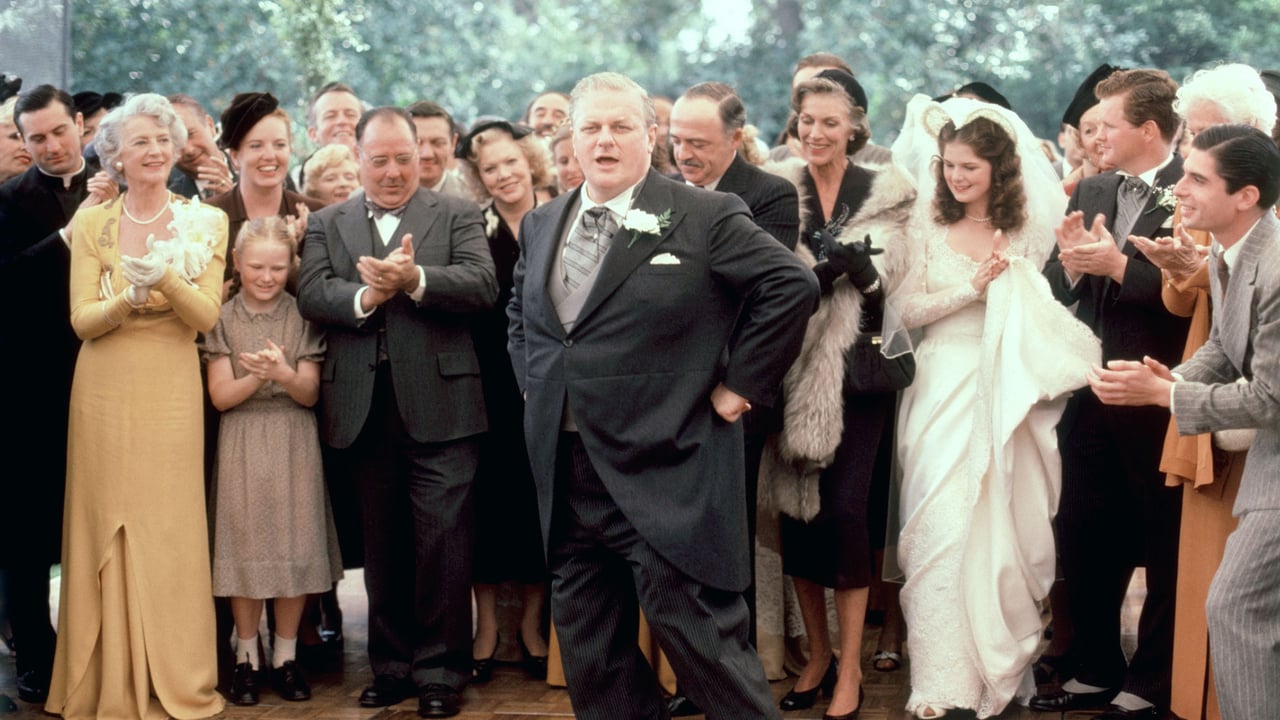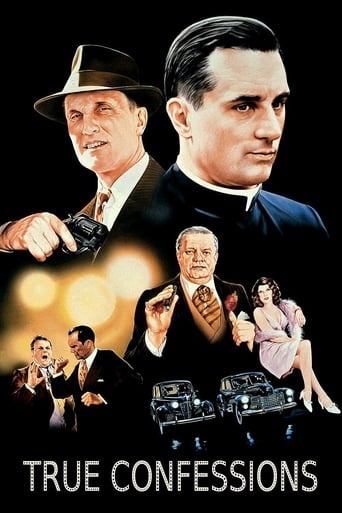

Robert De Niro as a monsignor with the Los Angeles archdiocese and Robert Duvall as his somewhat-estranged Irish-Catholic brother, a seen-it-all police detective working on a murder case in 1940s Los Angeles. Following a local priest's death as a customer at a brothel, a prostitute's corpse (cut in two) is found dumped in a vacant lot; the detective and his partner follow a trail of dirty dealings that lead back to the church--with his brother's affairs under suspicion. Dour adaptation of John Gregory Dunne's novel, by Dunne and wife Joan Didion, given a tactless treatment by director Ulu Grosbard, who allows the camera to exploit the majority of the female characters (both living and dead)--and for what purpose, titillation? An R-rating? Grosbard also fails to shape the drama at hand, so that the third-act confrontations have little effect. De Niro (handsomely carrying a bit of his "Raging Bull" weight) doesn't seem to be invested in this role; he's playing a holy hypocrite, but there are no other layers to the man. Also, his scenes dealing with the church and his fellow priests or performing services are deadly dull. Duvall at least has the benefit of salty dialogue exchanges (and colorful interaction with scene stealer Kenneth McMillan, who has wily eyebrows); but his acting, too, is flattened out by the handling, while his smile looks forced and desperate. Perhaps a sharper final edit might have solved Grosbard's problems with pacing and narrative, but what's on the screen is curiously underwhelming. The fine production values and technical aspects are a plus, Georges Delerue's score is classy, and several of the supporting performers (particularly Rose Gregorio as a madam and Charles Durning as a construction czar and lay Catholic) give the film a boost. ** from ****
... View MoreRobert De Niro and Robert Duvall are compelling and believable as two brothers, Des and Tom Spellacy. Des (De Niro) is a savvy Monsignor with the Catholic Church of L.A., and Tom is a hard driving detective with the L.A.P.D. Tom is soon on the case of Louise Fazenda, a "party girl" who's been hacked into two pieces. The case will involve various characters, chief among them a truly slimy construction magnate played superbly by Charles Durning. The case will even involve the Church, to some extent.Scripted by Joan Didion and John Gregory Dunne, from the latters' novel, this takes its inspiration from the notorious unsolved "Black Dahlia" murder of real life. The material does have real emotional resonance, as well as an enjoyably sordid and sleazy quality as things like prostitution and a stag film factor into the tale. As we will see, the characters are often compromised to one degree or another, even if they're not outright corrupt like the Amsterdam (Durning) character. Deliberately paced, and moody, "True Confessions" benefits from a straightforward approach by director Ulu Grosbard ("Straight Time"). The filmmaking is slick, but doesn't call attention to itself at the expense of spinning a good and meaty yarn. The music by Georges Delerue is affecting without ever becoming overly manipulative.Two moving performances by the two Roberts are the heart and soul of this fine film. The supporting cast is exemplary, with Durning scoring as the vile antagonist. Kenneth McMillan regularly steals his scenes as Toms' cheerfully, mildly sleazy partner Frank Crotty. Ed Flanders, Cyril Cusack, Burgess Meredith, Rose Gregorio, Dan Hedaya, Jeanette Nolan, and Pat Corley all add an indelible presence and gravitas to the proceedings. Be sure to watch for Louisa Moritz, Darwyn Carson, Matthew Faison, Richard Foronjy, and James Hong in small roles.Well worth watching.Seven out of 10.
... View MoreThis film tells the story of two brothers and also two of the greatest actors of own generation, story that have potential, but... Premise of film is thriller/drama, but part that was supposed to be thriller was not elaborated clearly. The plot is about nonsense. Robert De Niro and Robert Duvall give the best that could give from this screenplay, and Charles Durning as Jack Amsterdam was quite remarkable. Pace of this movie is slow, even too slow and plot is also predictable. Very bad ending as well. This is a film that was to easy to forget. In short, pretty average film with some potential to be a true classic. Rating:6/10
... View MoreA rating I think I might amend upwards if I broke my habit of a lifetime and watched films more than once initially, as there's unquestionably a lot going in this post-war drama which borrows from the infamous "Blue Dahlia" murder for period colour and effect, which would be repaid I'm sure through further investigation.What I saw was good enough however, superb ensemble acting (in even the smallest parts). great set design (count the number of authentic cars milling about in the street, or smell the mustiness and dried in blood at the pornographer's studio where the butchery was done) and an absorbing and involving narrative intertwining the lives of the great and the good in a tale taking in sibling relationships, sex, corruption, murder of course and even religion...it's quite a heady mix as you can see from these ingredients.For all that, this is a film with periods of inaction, relying on dialogue and the spaces in between for effect. I had some difficulty believing that De Niro and Duvall were brothers (a character's reference to their family resemblance has to be an in-joke), never mind that one is a cop and the other a priest. Both actors have undeniable presence and certainly inhabit their characters but I didn't think their relationship rang true - the piece could have worked if they were just long-standing friends.The support players are better yet, Kenneth McMillan as Duvall's "look-the-other-way" partner, Charles Durning as the big-fish-in-a-small pool local property baron, greasing the palms of the church and police to further his ends until the tap is turned off on him (and who does a mean Irish jig at his daughter's wedding near the start, indulgently watched by his acolytes) and best of all for me Rose Gregorio as Duvall's old flame, a burned out brothel madame, left to fend for herself.The plotting is intricate and many scenes seem to be inserted purely to define a character rather than to advance the story but in the end this is no accident and you feel at all times that the people and situations depicted are real. Women don't come off very well in the piece, all bar the brother's mother maltreated in some way or other, which is to its detriment.The final scene between De Niro and Duvall effectively reminds the viewer that the story is above all about their fraternal relationship and how that overcomes even career-destroying conflict. Having fractious relationships with each of my own two brothers myself, I could certainly relate to that...
... View More